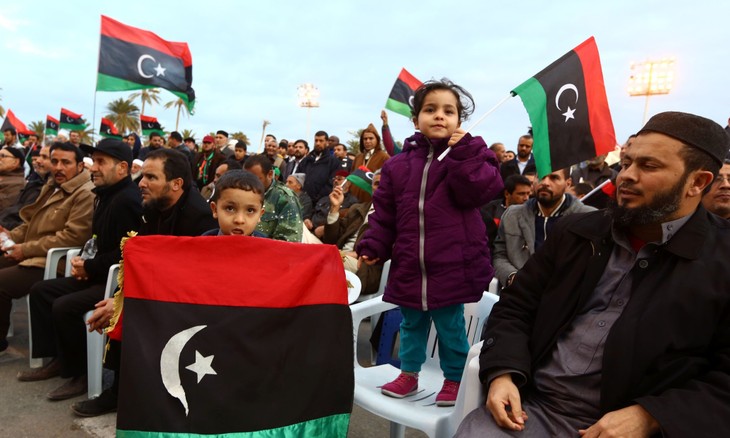(VOVworld) – 5 years ago, a revolution called “Arab spring” swept through North Africa and the Middle East, toppling regimes with waves of violence and riots.
 |
Libyans wave national flags on Martyrs’ Square in Tripoli as hundreds of people demonstrated in support of the UN-brokered dialogue between warring factions.
(Photo: Hamza Turkia/Xinhua Press/Corbis) |
In 2011 several North African and Middle Eastern countries, backed by the West, launched “a revolution towards democracy” dubbed the “Arab spring”. The spring revolution has neither flowered nor borne sweet fruits, only bitter fruits. Libya, Tunisia, and Syria have plunged deep into political, social, economic, and security crises, which have forced millions of people to flee their homes.
A political seism
In December, 2010, a fruit vendor in Tunisia set himself on fire to protest police confiscation of his produce. The incident ignited demonstrations and riots throughout the Arab world.
A month after the Tunisian incident, the Arab Spring had spread to most of the 23 countries and territories in North Africa and the Middle East. The socio-political seism brought down the governments of Yemen, Libya, and Bahrain. NATO airtrikes helped militants in Libya topple the regime and kill leader Muammar Gaddafi. It didn’t lead to stability in Libya. A power vacuum led to economic recession, social division, and a fierce struggle for power. In Syria, the seism could not bring down President Bashar Al Assad, but it pushed the country into a civil war.
North Africa and the Middle East have turned a page of history but democracy is not yet in sight. People’s yearning for a democratic society and a life of peace has so far been denied.
Hazardous flowers and bitter fruits
The Arab Spring has reset the balance of power in North Africa and the Middle East, while causing chronic instability.
The civil war in Syria has killed 250,000 people and forced millions of people to flee their home and seek refuge in Europe. Syria has become fertile soil for terrorism. In Yemen, political, religious, and sectarian differences have erupted into tribal warfare. In Egypt, since President Hosni Mubarak was overthrown, the political and economic landscape has been embroiled in a prolonged crisis. In Libya, a unity government has now been established but the Arab Spring has seriously damaged the country. Part of Libya is now under Islamic State control. Tunisia, the starting point of the Arab Spring, is facing serious security threats. Tunisia has exported the largest number of IS recruits.
The past 5 years has been a difficult period for North Africa and the Middle East. Freedom and democracy have been elusive and political instability, bloody conflict, and growing poverty have ravaged many countries.